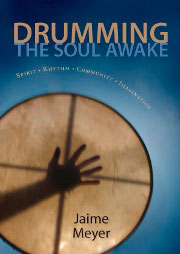Naming and Renaming
 Thursday, June 13, 2013 at 12:19PM
Thursday, June 13, 2013 at 12:19PM 
I’m thinking about the power of naming and renaming. I’m thinking about it because it’s the focus of a string of ceremonies I’m offering next week for the summer solstice.
Our name is our visible sign of how we belong to this world, and what kind of qualities we carry. Every name, like every word in any language, has a history that reveals shades of mythic meaning. My name, Jaime, emerges from the Hebrew Jacob, one of the primordial patriarchs in that tradition, known for being a trickster. Your name carries power for you. I urge you to research it.
Naming is how we make things real. We see a tree and it’s just a tree. When we find out it’s a cedar tree, it becomes more real. It is distinct from the Arbor Vitae, which looks, feels and smells a lot like it, but is not from the Cedar family, but from the Cyprus family (that’s according to our system of naming). In the book of Genesis, Adam names the animals and that is how, fulfilling the theme of that story, he gains dominance over them. He chooses their name for them but they don’t choose his name for him.
In modern America, we don’t pay attention to many deep spiritual connections, and naming is one of them. We are given our names by our parents. Sometimes they name us for spiritual reasons, but most often our name is given to us without the thought of the mythic power the name carries. We named our 8 year old Ethan because we liked it, and the softness of it seemed to suit him. We found out later it was in the top three trendy names in America that year. I had no idea. I looked it up to find it meant “steadfast.” I liked that, because my theologian’s mind liked that it is one of the primary descriptions of God in the Hebrew Scriptures – God’s love is steadfast, unwavering, committed. As Ethan grew, we realized the other side of steadfast is “annoyingly, mind-batteringly, heels-digging-in stubborn.” Our names carry power, whether we realize it or not.
In many spiritual traditions, names are changed when we undergo a spiritual transformation. That transformation frequently involves some kind of initiatory experience. Sometimes those experiences are chosen to bring on a spiritual transformation. Nuns choose to be transformed into brides of Christ, and they change their human name to a spiritual name – a name of a saint. In indigenous traditions, names are changed, or new names added in after certain kinds of a ceremonial initiation. We graduate from academic study, and we add a title to our name, which is a way of taking on an additional name.
In shamanic traditions, names are changed or augmented as part of healing rituals. Sometimes names are changed when people have been sick for a long time. I worked in the Hmong community for a long time. A friend told me about her 8 month old daughter begin renamed by the shaman because she was sick and cried all the time. The shaman said that her spirit didn’t like the name her parents gave her, it didn’t suit her energy or her ancestors. He asked the spirits what name she wanted. They changed her name and the baby became quite happy.
In healing, the name change is a visible sign in this world that we have made an inner transformation. Changing or adding a new name also is a way to summon a kind of energy that we need – a new kind of connection that we seek, that we need to help us along on our transformation. Carrying the name is our way of saying we will carry that energy, work with it, learn from it, and honor it.
In the naming and renaming ceremonies this upcoming solstice week, the basic idea is to draw on the fiery power present in nature right now at the summer solstice to see and from a name that can embody spiritual power for the person receiving it. It may be a name that has been present for them for a long time and they haven’t seen it. It may be a name that surprises them. It may be a name that heals an old shame or anger. It will be a name that connects them to the power of the life force and to the power of love.
These ceremonies take place in the House of Spirit Medicine in my back yard. The house is built of bent red willow (which carries great spiritual qualities of love, forgiveness and adaptability) after the style of Mongolian yurt or a Native American sweat lodge. We’ll drum, sing, pray and vision in a variety of ways asking for a new name to emerge to help us change our inner story of who we are and what we are doing in this life. If you’d like to join, there are still a few spots left. Email me: drummingthesoulawake@gmail.com

Reader Comments